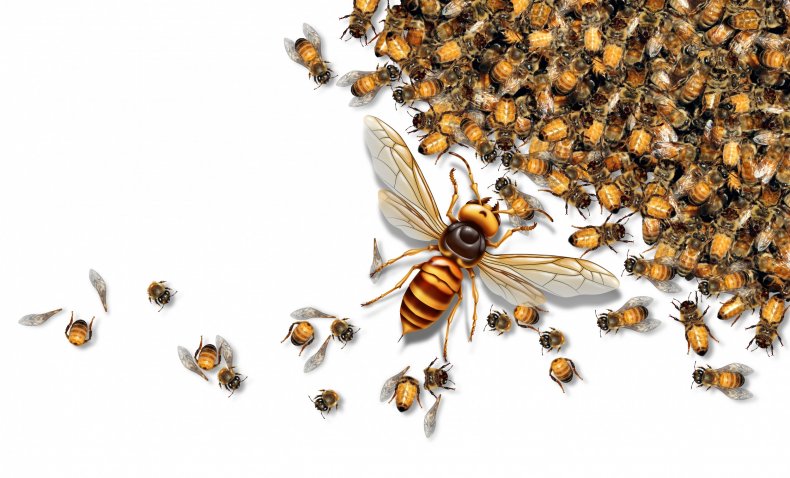Honey Bees Scream as They Are Attacked by Giant Hornets
Asian honey bees scream as they are being attacked by giant hornets, scientists have discovered.
By recording acoustic signals from bees defending their nests from hornets, researchers were able to pinpoint an alarm signal akin to screams of fear.
Giant hornets represent a major threat to honey bees. They are known to launch group attacks to decimate colonies in the space of just hours.
One hornet species, Vespa soror, begins its attack by sending out a scout to find a bee colony. After gathering recruits, the hornets kill the honey bees, occupy the nest and feed the undefended brood to their larvae.
Heather Mattila, from Wellesley College, Massachusetts, studies the organization of animal societies and insect communication. In December last year, she published a study showing that honey bees will use animal poop to defend their nests from giant hornets.
Bees were found to place feces at the entrance of the nests and, in spots where it had been placed, hornets were less likely to land.
How the fecal spots repelled the hornets is unknown, but Mattila said it appeared to be an "effective defense" against attacks.
In a study published in Royal Society Open Science, Mattila and colleagues have looked closer at what happens before and during an attack.
They said hornets and honey bees appear locked in an "evolutionary arms race." The latter's defences include a "bee carpet" that can engulf an individual hornet to overheat and suffocate it, the aforementioned poop deposits, as well as a "visually intimating display" of body shaking.
But how are these defenses coordinated? To find out, the team looked at the acoustic signals and defensive responses of honey bee colonies that were targeted by the hornet species Vespa soror and Vespa velutina.
They measured the regular acoustic signals when not being attacked and compared them with the attack conditions.
"We knew that the colonies became really noisy when the giant hornets appeared outside colonies and in the minutes after they left," Mattila told Newsweek.
"However, the bees make lots of sounds, so it was a matter of getting the recordings, then using acoustic analysis software to dissect out all the sounds that were being made in a hive at once, minute by minute, and tracing those sounds back to what was going on outside the hives, which we had recorded with video cameras."
Findings showed that during an attack, there was a dramatic increase in vocal signals, with Vespa soror attacks prompting a seven-fold increase in signalling. This species is the larger of the two, with queens growing up to 1.8 inches in length.

They found that when Vespa soror was directly outside the nests, the bees produced a previously undescribed signal that they have called antipredator pipes.
"Antipredator pipes share acoustic traits with alarm shrieks, fear screams and panic calls of primates, birds and meerkats," the researchers wrote.
Mattila said it is unclear, at present, whether the antipredator pipes are motivated by fear or a more akin to a battle cry: "These are two different kinds of motivators, and both are important in the animal world. What we need to do next is what is called a playback experiment. In this case, we would play back the alarm sounds to colonies that aren't being attacked by hornets and see how the bees react. If they respond as though there were a hornet, then the antipredator pipe is a battle cry."
Concluding, the team say honey bees appear to "employ a diverse alarm repertoire" when being attacked by hornets, and that these are similar to the sophisticated systems of socially complicated vertebrates.
She said these Asian honey bees have become "very well defended" and giant hornet attacks do not tend to be too severe as a result.
"However, European (or Western) honey bees don't have these well-honed defenses, so they are much more likely to have a colony be wiped out by a pack of attacking giant hornets," Matilla said. "That is why we are so concerned about the introduction of giant hornets to the west coast of North America."

